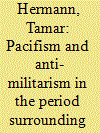|
|
|
Sort Order |
|
|
|
Items / Page
|
|
|
|
|
|
|
| Srl | Item |
| 1 |
ID:
064636


|
|
|
| 2 |
ID:
154300


|
|
|
|
|
| Summary/Abstract |
The claim that because a peace agreement has not been signed between the Israelis and Palestinians peace activists have failed is baseless
|
|
|
|
|
|
|
|
|
|
|
|
|
|
|
|
| 3 |
ID:
100130


|
|
|
| 4 |
ID:
098065


|
|
|
| 5 |
ID:
089200


|
|
|
|
|
| Publication |
2009.
|
| Summary/Abstract |
This article identifies several theoretical approaches to the role of culture in the construction of national identity. Embedded in the presently emerging approach, which emphasises the relations between popular culture/consumerism and national identity, this study focuses on a specific consumer good manufactured in Israel in the early 2000s, the height of the second Palestinian Intifada (uprising): small sugar packets bearing portraits of the patriarchs of Zionism. The analysis of this product, employing semiotic analysis, interviews and focus groups, locates it in the five 'moments' of du Gay's 'circuit of culture' (i.e. identity, representation, production, consumption and regulation). Three main general arguments were stated, empirically examined and largely sustained: (1) Consumer goods are used not only for constructing national identity but also as a means for 'healing' it; (2) in their 'healing' capacity, representations of nationalism on consumer goods do not add new elements to representations offered by the 'high' official version of nationalism but replicate them in a simplified way; (3) while trivialising the insights and concepts that originated in 'high' culture, consumer goods expose the prejudices, stereotypes and rules of inclusion and exclusion that in 'high' culture are often hidden in a sophisticated manner.
|
|
|
|
|
|
|
|
|
|
|
|
|
|
|
|
| 6 |
ID:
119474


|
|
|
|
|
| Publication |
2013.
|
| Summary/Abstract |
â??B oth P alestinian nationalism and Z ionism, as concepts, embody the same principle; namely both are nationalist movements based on the requirement of a homeland for their own people.â? 1 The critical problem, however, seems to be that both have been claiming the same piece of land for their homelands, and thus the source of trouble is more practical than ideological. Contrary to the assumption hidden in this articleâ??s given title, political ideologies do not recognize nor reconcile with each other, nor do they determine who recognizes whom and who reconcile with whom. It is only individuals, and sometimes also collectives, whoâ??metaphorically speakingâ??initiate or undergo such modifications of relationship. Individuals tend to justify changes in their personal relations by terms that are either emotional ( e.g., fallen in love with her, cannot stand him anymore) or based on moral-normative grounds ( e.g., he behaved decently, she promised, yet . . .). Collectives, on the other hand, often rely on political ideologies as their justificationâ??or excuseâ??for moving from one state of relations with another collective to a different state. Yet, as the dominant Political Realist school argues, particularly, although not only, on the collective/national level, inter-relations are first and foremost determined by needs and interests of the actors. Ideologies are just the legitimizing hooks to hang on, not the genuine source of or the motivation for such a change.
|
|
|
|
|
|
|
|
|
|
|
|
|
|
|
|
|
|
|
|
|